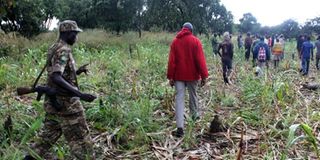Nwoya locals lose sleep over stray wild animals

Uganda Wildlife Authority rangers and residents walk through the destroyed farmlands in Agago District recently. Stray animals from game reserves are killing people and destroying their gardens in Nwoya District. FILE PHOTO
What you need to know:
Justification. The leaders say the marauding animals have claimed many lives and property.
Leaders and residents of Nwoya District have appealed to the Uganda Wildlife Authority (UWA) to erect electric fences around the Murchison Falls National Park boundaries to avert intrusion of wild animals into community land.
Their demands come amid rising cases of stray animals from the game reserve killing people and destroying their gardens. The latest happened on July 18 when an eight-year-old boy was killed by an elephant on his way to school.
The district chairperson, Mr Patrick Okello Oryema, told Daily Monitor last Thursday that the continuous intrusion of wildlife, especially buffaloes and elephants, into community land is bound to negatively impact human-wildlife relations.
He noted that the vice has been facilitated by limited deterrence features such as electric fences and trenches around the park’s boundaries, leaving the animals to wonder freely into people’s homesteads and gardens.
“We are demanding that government and UWA erect electric fences around the national park boundary as a measure of controlling the movement of the wild animals. Our people cannot live comfortably when wild animals are destroying their crops and at the same time killing them,” Mr Oryema said.
He noted that the most affected communities are in Koch Goma, Koch Lii, Got Apwoyo and Anaka sub-counties that border the national park, adding that farmers have been discouraged from practicing large scale agriculture.
Mr Oryema said so far this year, more than 500 hectares of gardens have been destroyed by marauding elephants, posing a threat to food security.
“Our people regret going back to their ancestral land and wished they had remained in the internally displaced people’s camps. People had believed their lives would change through agriculture but the wild animals are frustrating their efforts,” Mr Oryema said.
He urged government to review the compensation policy so that people who have sustained injuries or lost their loved ones and property in the past as a result of attacks from wild animals can be compensated.
Koch Lii Sub-county chairperson Simon Ongom said since August last year, at least 30 people from his area have had their crops destroyed by elephants crossing from the national park.
He noted that elephants tend to invade gardens in the months of August and October, which is harvest time for crops such as maize, millet, sorghum and cassava.
According to Mr Ongom, farmers have since shifted to growing of soybean, which, he said, is not sustainable for livelihood improvement.
Mr George Oryema, a resident of Koch Lii Sub-county, said he lost 30 hectares of sim sim [sesame] in 2016 when a herd of elephants invaded his garden but to date, he has not received any compensation from UWA.
According to Mr Oryema, UWA has been more active in cracking down on poachers and failed to pay attention to stray animals.
“It seems animals are more important than our livelihoods. When a human being tries to enter the national park, he either faces jail or ends up being killed but when the animals destroy our property, UWA officials keep silent. We want the problem addressed before we start killing the animals,” he said.
UWA communications manager Bashir Hangi acknowledged the plight of the residents living near the national park, adding that they are doing all they can to control the wild animals.
He noted that although they have dug trenches around the park, plans are currently underway to begin erecting electric fences not only in Murchison Falls National Park but also in other wildlife conservation areas where there are human-wildlife conflicts. Although he did not disclose the amount of money budgeted for the exercise, Mr Bashir said they are confident the electric fences will be erected starting this financial year.
PLANS
In November last year, President Museveni, while launching the 2,000-hectare rice farm belonging to FOL Logistics Uganda Ltd in Anaka Sub-county, Nwoya District, blamed the former UWA executive director, Dr Andrew Segguya, for his failure to control wild animal intrusion into community land.



